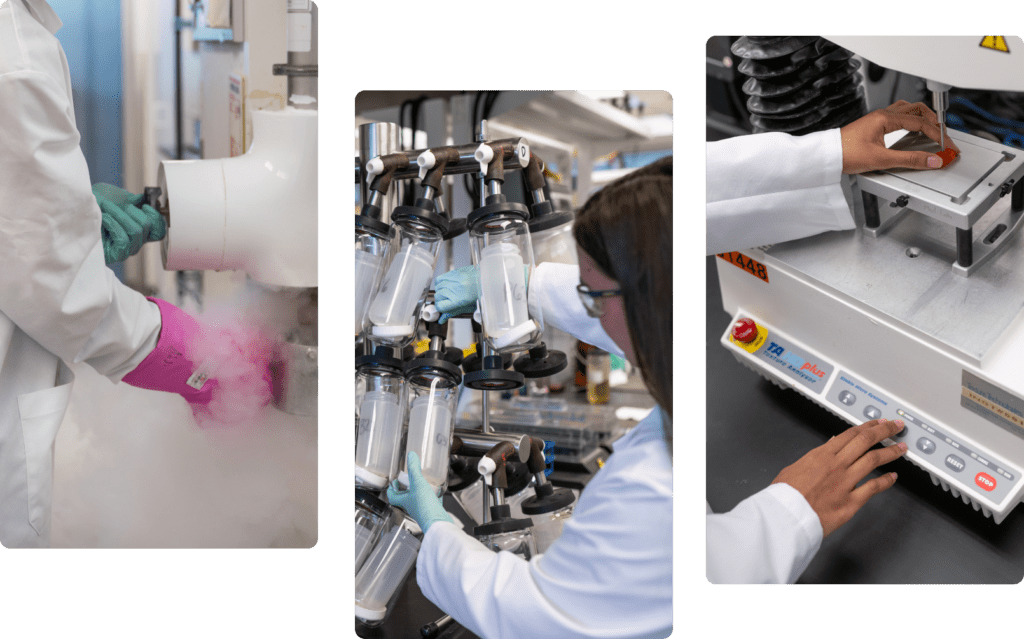Protein (Dumas) Test
-
Price
$30 per analysis
-
Turnaround time
7 - 9 Business Days
-
Rush
Available


Technical data sheet
Method description
Total nitrogen is determined using a combustion instrument operating on the Dumas principle. This method is universal for the determination of nitrogen content and can be used for nearly all food products. Pure oils and shortenings may cause fires in the instrument and should be assayed by the Kjeldahl method. The sample is completely combusted at high temperature in the presence of pure O2 (99.9%). Combustion products are H2O, CO2, NOx, and N2. Water vapor, oxygen, and CO2 are removed from the resulting gas stream by a series of thermoelectric coolers and chemical sorbents. NOx is reduced to N2 when passed through a hot column packed with copper. The resulting N2 is passed to a thermal conductivity detector, where it is quantified using helium as the carrier gas.
Acceptable matrices
Food and Food Ingredients
Unacceptable matrices
Fats, oils, and samples greater than 50% fat.
Limit of quantitation
0.648% - 0.798% Protein (factor dependent)
Equipment
Protein/Nitrogen by combustion analyzer.
Method reference
AACC 46-30; AOAC 992.15
Reportable unit
% Nitrogen
Sample size requirements
10 g
Information required by submitter
Please supply estimates
Common Protein (Dumas) Test Testing Questions
The Dumas method is based on a fact that is common across amino acids and proteins: amino acids contain Nitrogen. Instead of measuring the amino acids and proteins directly, the Dumas method measures the amount of Nitrogen in the sample when combusted. A protein factor is used to convert the amount of Nitrogen into a Total Protein value. The Protein Factor is determined based on the type of sample and the source of protein.
The Dumas test can be used to determine the Total Protein (crude protein) in a sample, as well as the amount of Nitrogen. This can be used for nutrition labeling, as long as a protein claim is not being made.
The Dumas test does have limitations. Solvents, such as alcohol, and samples high in fats/oils can create fire hazards. The Kjeldahl method is a better choice for these types of samples.
The Dumas method, similar to Kjeldahl, is not a true protein test. Any nitrogen-containing ingredients or compounds can lead to inaccurate results.
The Dumas test can be used to determine the Total Protein (crude protein) in a sample, as well as the amount of Nitrogen. This can be used for nutrition labeling, as long as a protein claim is not being made.
The Dumas test does have limitations. Solvents, such as alcohol, and samples high in fats/oils can create fire hazards. The Kjeldahl method is a better choice for these types of samples.
The Dumas method, similar to Kjeldahl, is not a true protein test. Any nitrogen-containing ingredients or compounds can lead to inaccurate results.
Both Kjeldahl and Dumas are crude protein methods that measure the amount of Nitrogen that is then converted to a Total Protein Content. The principle is the same, however, the chemistry used to measure the Nitrogen is different.
Dumas uses combustion to release nitrogen gas and nitrogen compounds. The nitrogen compounds are separated and reduced to N2 gas while passing through various catalysts and systems.
The Kjeldahl method uses strong acids and catalysts to form nitrogen-containing compounds, such as ammonia. The nitrogen content is then typically measured through titration.
The Dumas method offers several advantages vs. Kjeldahl. Some of the advantages include:
-Faster testing time and better efficiency in testing. This allows for quicker testing.
-Reduces the need for strong acids and toxic catalysts (like Mercury sulfate), which is a gain for human safety and environmental impact.
-The above advantages also translate into lower testing costs for our clients.
While our sales and customer service team are happy to answer general testing questions, consultations typically start at a rate of $250 per 30 minutes regarding the interpretation of reported test results or questions about our test methods. We cannot consult on regulations, tolerance limits, or claims.
We make every effort to keep our methods and detection limits up to date according to the latest standards and qualifications. If you have any questions regarding the limit of detection/quantification or method references, please contact our Customer Service team at 1-800-245-5615.
Our standard turnaround time is 10 business days for most assays. There are some assays that require a longer turnaround time. We also offer a RUSH service that is half the time of the standard turnaround time of the assay at double the cost of the assay. A few assays that we provide cannot be rushed due to the nature of the test. Please check the specific assay you are interested in regarding the ability to RUSH the turnaround time.
Medallion Labs, a division of General Mills, offers multiple areas of expertise for analytical testing and product evaluation for the food and ingredient industry. Our areas of expertise include Chemical Analysis, Nutritional Analysis, Food Safety, Shelf Life Studies, Microbiology, Specialty Fibers, Physical Testing, Allergen Testing, as well as Product Evaluation (which includes Product Performance and Sensory Evaluation) and Technical Consulting/Method Development. Our methods are developed for the testing of food products and ingredients.
Do you have a more specific question?
Our food testing experts are here to help.
"*" indicates required fields

Helpful content related to Protein (Dumas) Test
Let’s Get to Work!
Submit your order online and ship your samples today. If you have questions, we are always here to help.
Medallion Labs
A food testing program designed with mid-market and enterprise food and ingredient manufacturers in mind.
